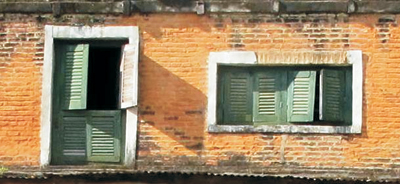“I can’t go back to yesterday, because I was a different person then.” (Lewis Carroll, ‘Alice in Wonderland’)
Really? Are we so different that we can’t go back? I don’t think so. I am more inclined to believe actress Audrey Hepburn who once said that “...one should go back and search for what was loved and found to be real.” That’s where memory and memoir begin.
 I recently returned to the village where I first lived in Nepal almost five decades ago. I wanted to recapture something of ‘yesterday’. We writers do this sort of thing: revisit the past then write about it, though the memories may be blurred.
I recently returned to the village where I first lived in Nepal almost five decades ago. I wanted to recapture something of ‘yesterday’. We writers do this sort of thing: revisit the past then write about it, though the memories may be blurred.
It was 1963, and doing village development as a Peace Corps volunteer was my thing. I was ambitious, optimistic, and idealistic. Living in village Nepal for two years was an adventure, a challenge. And while I gave a little of myself to the community, I gained far more in return. It changed my life.
Now, as then, Kunchha, Lamjung has a few shops and houses, a post office, a police post, and a school, and some wonderful folk of various castes and ethnicities. And though there’s been some ‘modernization’, the changes seem more superficial than substantial. I saw one new concrete building amidst the very old mud brick ones that I remember. The house I once lived in apparently fell down; there’s a smaller one in its place. Electricity is new, mobile phones are ubiquitous, and there is bus service now on a very rough road. Back in 1963 we walked to Kunchha two days from Pokhara and seven days more on to Kathmandu. Today, you can bus to or from Kathmandu in about seven hours, and arrive in time for tea.
I was posted to Kunchha with another volunteer. We defined ourselves as ‘problem solvers’. Sometimes we helped the district engineer who looked after trail, school and water system maintenance. For a few months we ran a smallpox immunization program vaccinating 25,000 villagers, mostly children. One spring when crops failed I conducted a district-wide food deficit survey after which an aid agency shipped in tons of rice and wheat. And we tutored several young men in English, each of whom went on to work in development or teaching. They’re retired now and live elsewhere.
Today at Kunchha, as elsewhere across Nepal, the poor continue to eke out a difficult living from the soil, while the more fortunate tend to move on to better opportunities elsewhere, leaving their villages behind looking forlorn.
During my recent visit the local health post officer introduced himself. “I’m ‘Rosey’,” he said. I must have looked puzzled. “That’s what you called me when I was a young school boy,” he added. Ah, but of course. I’d forgotten! Now ‘Rosey’, too, is about to retire, he said. Time flies and memories blur.
Memoirs can take various forms, from short essays to whole books. I kept a journal in Kunchha from which I might begin to craft a memoir (after I correct several naïve misunderstandings that I recorded in a cramped handwriting). I’ve already published a few stories, one about a Himalayan-size thunderstorm, and another about the smallpox campaign. But there is more to tell... Like who’s gone and what they left behind. How life was then, and how unchanged it seems now. And, not least, answering the inevitable question, ‘So what?’
A memoir should tell who we were and what we learned back then, ‘yesterday’. It should reveal something of the inner self and the context of change and personal development. For me, it was a time of discovery and transformation. It gave me perspective upon which to build a life...
“There is nothing like returning to a place that remains unchanged to find the ways in which you yourself have altered.”(Nelson Mandela, ‘Long Walk to Freedom’)
As an American Peace Corps Volunteer, Don Messerschmidt lived at Kunchha in the central hill district of Lamjung from 1963 to 1965. Afterward, he stayed on in Nepal for many years as a teacher, anthropologist, writer and development consultant. He can be contacted at don.editor@gmail.com, and he blogs at dmesserschmidt.blogspot.com.









